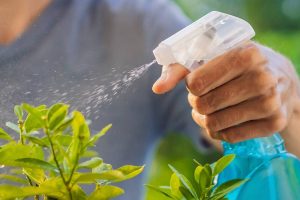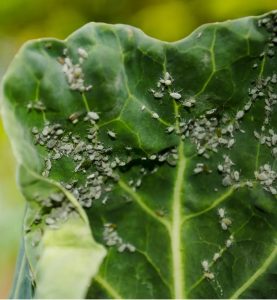Aphids, also known as plant lice, are one of the most common garden pests. These tiny, soft-bodied insects can cause significant damage to your plants by sucking sap from leaves, stems, and buds. Over time, this weakens the plants, causing distorted growth, yellowing, and even the spread of diseases. Additionally, aphids excrete a sticky substance known as honeydew, which attracts ants and can lead to the development of sooty mold on plants.
While there are many chemical treatments available to control aphids, homemade prevention methods are safer for the environment, your garden, and beneficial insects like bees and ladybugs. Plus, they’re cost-effective and easy to make with household ingredients. In this article, we’ll explore four effective homemade aphid preventions that will help keep these pests at bay without resorting to harsh chemicals.

1. Soapy Water Spray
One of the simplest and most popular homemade aphid preventions is a soapy water spray. Soap disrupts the protective outer layer of aphids, causing them to dehydrate and die. This method is particularly effective when dealing with small to moderate infestations.
Materials Needed:
- 1 tablespoon of mild liquid dish soap (unscented and biodegradable)
- 1 quart (about 1 liter) of water
- A spray bottle
Instructions:
- Mix one tablespoon of dish soap with one quart of water in a spray bottle.
- Shake the bottle gently to combine the solution.
- Spray the mixture directly onto aphids and infested parts of your plants, making sure to coat the undersides of the leaves where aphids often hide.
- Repeat this process every few days until the aphids are gone.
Tips for Success:
- Use only mild liquid dish soap, as harsh detergents or soaps with fragrances can damage plants.
- Be sure to test the solution on a small area of the plant first to ensure it doesn’t cause leaf burn or other damage.
- Rinse the plants with plain water a few hours after spraying to remove any soap residue that could harm the leaves.
Soapy water sprays are safe to use on most plants and are particularly effective on vegetables, fruits, and ornamental plants.

2. Neem Oil Spray
Neem oil is a natural, organic insecticide derived from the seeds of the neem tree. It contains azadirachtin, a compound that disrupts the feeding and reproduction of aphids, ultimately killing them. Neem oil is a great option because it not only targets aphids but also repels other harmful pests like spider mites, whiteflies, and caterpillars. Additionally, it is safe for beneficial insects when used properly.
Materials Needed:
- 2 teaspoons of neem oil (cold-pressed is best)
- 1 teaspoon of mild liquid soap (to help the oil mix with water)
- 1 quart of water
- A spray bottle
Instructions:
- Mix two teaspoons of neem oil and one teaspoon of mild liquid soap with one quart of water in a spray bottle.
- Shake well to combine the ingredients.
- Spray the mixture onto affected plants, covering both the tops and undersides of the leaves.
- Reapply every 7-10 days, especially after rain or if aphid activity increases.
Tips for Success:
- Neem oil works best when applied in the early morning or late afternoon to avoid direct sunlight, which can cause leaf burn.
- Be consistent with applications, as neem oil affects the aphids’ feeding cycle over time.
- If you are using neem oil on edible plants, be sure to follow any guidelines regarding the pre-harvest interval (the time between spraying and harvesting).
Neem oil is effective not only as a treatment but also as a preventive measure, keeping aphids from infesting your plants in the first place.
3. Garlic Spray
Garlic is known for its pungent smell and natural insecticidal properties. Aphids, like many pests, are repelled by the strong odor of garlic, making it an excellent deterrent. Garlic spray is easy to make at home and can be used as a preventive measure or to treat light aphid infestations.
Materials Needed:
- 1 bulb of garlic
- 1 quart of water
- A few drops of liquid soap (optional, to help the solution stick to plants)
- A spray bottle
Instructions:
- Peel and crush one bulb of garlic.
- Place the crushed garlic in a quart of water and let it sit overnight or for at least 12 hours.
- Strain the garlic-infused water into a spray bottle.
- Optionally, add a few drops of liquid soap to help the spray adhere to the plants.
- Spray the garlic solution on aphid-infested plants, focusing on the areas where aphids are present, such as the undersides of leaves.
Tips for Success:
- Garlic spray can be applied every few days as needed.
- It is best used as a preventive measure to keep aphids away from your plants.
- Avoid spraying in direct sunlight to prevent leaf burn.
Garlic spray not only deters aphids but also repels other common pests like whiteflies and caterpillars. Its strong odor may also help to keep other garden pests at bay.
4. Essential Oil Spray
Essential oils, particularly those from strong-scented herbs, can be an effective way to repel aphids and other insects. Oils like peppermint, rosemary, and clove are known for their insect-repelling properties. When diluted and applied to plants, these essential oils can keep aphids away while providing a pleasant aroma in your garden.
Materials Needed:
- 10-15 drops of peppermint, rosemary, or clove essential oil
- 1 quart of water
- 1 teaspoon of mild liquid soap
- A spray bottle
Instructions:
- Add 10-15 drops of your chosen essential oil to one quart of water.
- Add one teaspoon of mild liquid soap to help the oil mix with water.
- Shake the mixture well and pour it into a spray bottle.
- Spray the solution onto aphid-infested plants, covering all affected areas.
Tips for Success:
- Reapply the spray every few days, especially after watering or rain.
- Essential oils can be strong, so test the solution on a small area of the plant before applying it widely to ensure there are no negative effects.
- Peppermint oil is particularly effective at repelling aphids while also deterring other pests such as ants and beetles.
Essential oil sprays are not only effective against aphids but also leave a pleasant scent in your garden. They are a great alternative if you prefer natural, non-toxic pest control methods.
Preventing Aphid Infestations
While homemade sprays are effective for controlling aphids, prevention is always better than treatment. Here are a few additional tips to help prevent aphids from infesting your garden in the first place:
- Encourage beneficial insects: Ladybugs, lacewings, and parasitic wasps are natural predators of aphids. Plant flowers like marigolds, daisies, and dill to attract these helpful insects.
- Maintain plant health: Healthy plants are more resistant to aphid damage. Be sure to water and fertilize your plants properly and prune away any dead or damaged growth.
- Remove weeds: Aphids often hide in weeds, so keeping your garden weed-free can help reduce the risk of infestation.
- Companion planting: Certain plants, like garlic, onions, and nasturtiums, naturally repel aphids. Planting them alongside vulnerable crops can help keep aphids at bay.